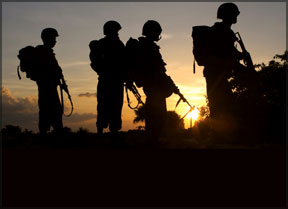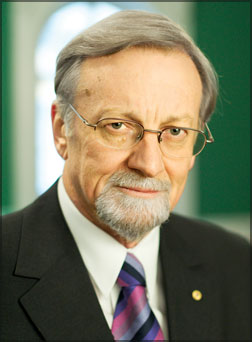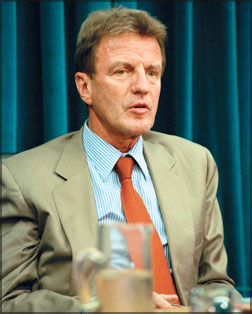The Aid Game Now
By Prof Rajiva WIJESINHA
For many years Sri Lanka has been a recipient of aid. Initially this
was to Government, but over the last couple of decades aid has
increasingly been given also to non-governmental organizations. However
the principle has always been that such donations are with the
concurrence of the Government. It has also been generally understood
that funds are to be used in accordance with general Government policy.
Principles
These principles have gradually been changing. Most obviously, at the
inception of the Ceasefire, the idea spread that there was a conflict in
Sri Lanka which required donors and the international community to hold
a balance. Unfortunately this idea was not repudiated promptly by the
then Government.
|

With troops entering the LTTE’s Wanni bastions some NGOs and
foreign groups are
conjuring a ‘humanitarian crisis’. |
Thus we now have situations when external agencies ‘call upon the
Government and other parties’, which is inappropriate for agencies
working to assist the Government. It is Government that has the prime
responsibility for all its citizenry. Any statement of principles should
make it clear that Government undertakes certain obligations, with the
assistance not the control of external agencies.
Secondly, there had sprung up, perhaps after the end of the Cold War,
an assumption that a particular mindset was dominant, and also the best.
This led to an unstated but pervasive feeling that the West was entitled
to tell other countries what they should be doing. This sense of
superiority crept even into the UN, though it is not generally
considered to be UN policy.
Donor nations
With the proliferation however of young Westerners in UN positions,
the ethos gained credence, and was sadly encouraged in Sri Lanka. Thus
Sri Lankan inputs have been downgraded in decision making, a process
encouraged by those Sri Lankans whose primary obligations are to their
external donors.
Finally, many donor nations also began to give assistance, or
increased the aid they gave, through non-governmental agencies based in
their own or like-minded countries. Initially this was designed to
promote efficiency, at a time when Governments began to doubt the
efficacy of government bureaucracies, even their own. At the same time
it allowed governments to engage in more subtle foreign policy
initiatives.
This facilitated prioritising aspects that would not have been
appropriate in bilateral relations.
Assistance
Thus, to sum up, we have assistance from foreign Governments or
multilateral agencies given a) in theory to Sri Lanka but often not
directly but through multilateral agencies or non-governmental
organizations b) for purposes not always made clear to or agreed by the
Sri Lankan Government
|

Gareth Evans |
It should be noted that, when aid is not given direct, the
transaction costs are increased. Though the ostensible aim is
efficiency, value for money is often much less, given the overheads.
These include Western style salaries to youngsters who could easily
be replaced by local staff with proper training, so as also to develop
capacity.
Sadly, instead of local capacity building being a priority, the new
aid dispensation seems designed to perpetuate donor decision making -
which affects not only practicalities but also policy.
Support for advocacy groups
What might be termed interference with policy has also been extended
through donor support for what are termed advocacy groups. In Sri Lanka
this reached a height in the first part of this decade, when the peace
process seemed to depend on it.
Sadly the mindset that was dominant then has been artificially
extended through massive international subventions. Thus, though that
mindset was conclusively defeated at successive elections, it is
privileged internationally.
The most extraordinary example of this occurred when Rolf Timans,
Head of Human Rights at the European Commission, called in our
Ambassador to pronounce on our Human Rights situation, and even suggest
that elections should not be held in the East since he had been informed
that the situation was not conducive.
|

Bernard Kouchner |
When I met Timans, he turned out to be a very nice person, obviously
anxious to know more about Sri Lanka. Leaving aside the briefings he got
from Colombo, he had however also been prey to advocacy groups, funded
by donors to go and repeat the same old story.
He had obviously not been totally taken in however for, though the
European Union office in Colombo had indicated that I should not do so,
he told me I could write to him direct, with clarifications as
necessary.
In short, here was a wonderful example of the local office working
together with local advocacy groups, to emphasize a particular viewpoint
that was certainly not representative of Sri Lanka. It was also odd
that, in the interests of their joint higher goals, or whatever they
thought they were promoting, they were so opposed to democracy. But,
sadly, it is that type of perversion which occurs when a few strongly
motivated individuals are given their head.
All this I thought was history. But it seems now to be rearing its
ugly head again, with what seems a concerted attempt by these advocacy
groups to denigrate the Sri Lankan Government publicly over the next few
weeks.
It began with a rather crude attempt to write to the UN Secretary
General to complain about Sri Lanka. Initially leadership seemed to be
taken by a couple of Sri Lankans, but it rapidly became clear that the
moving spirits were foreigners. These included representatives of
Amnesty International, of the International Working Group of Sri Lanka,
and of Gareth Evans’ International Crisis Group.
Bright idea
This last is still represented in Sri Lanka, by a young man called
Alan Keenan, who just happened to have known Rama Mani, of Right to
Protection fame, before she came to Sri Lanka.
Keenan, like a little boy complaining to anyone who will listen to
him, had the bright idea of writing also to Bernard Kouchner since, as
Keenan rather patronisingly puts it, ‘he likes to think of himself as
one of the inventors of humanitarian intervention. Of course, he’s got
his hands full with Georgia and Russia, as does much of the UN and
international system.’
The moving spirit against Sri Lanka at Amnesty seems to be Yolanda
Foster, who I remember as yet another of the charming groupies who used
to flock to Kynsey Terrace in the days when ICES, having abandoned its
pro-UNP stance of the eighties, was building up a reputation for
scholarship. The IWG character is Peter Bowling, considered by our
Mission in London to be close to the LTTE, a view he seems to justify in
his questioning of the idea that the LTTE might be restricting access to
food or forcing populations into their areas or refusing them to leave.
Finally, associated with these Britishers seems to be an Australian
called John Ball, though he does not appear to have contributed actively
to the proposed petition, now designed for the Human Rights Council in
Geneva rather than the Secretary General or Minister Kouchner.
Current efforts to destabilise
Does it matter that these advocates are gearing again to try to
embarrass Sri Lanka ? Unfortunately, it would seem that all this is part
of the desperate effort that was being made in early August to claim
that there was a humanitarian crisis in Sri Lanka.
The prompt efforts of the Government, accompanied this time by
uncharacteristic publicising of the supplies being sent up and the
yeoman service of Government agents and other official bodies, ensured
that particular build up was forestalled.
We were also helped by relatively responsible statements from the UN
that has been assisting us, making it clear that things were under
control now, though they could of course get worse. A particularly crass
headline, trying to attribute to the UN an attack on the Government that
that particular media outlet was pursuing, led to a firm response by the
UN, which made it clear that they would not let themselves be used.
So far, it seems, so good. But we have to remember that, for reasons
given above, there will be great pressure on the UN too, through its
younger members as well as non-governmental organizations that will see
their gravy train melt away if the Sri Lankan Government succeeds in
restoring peace and prosperity. Add to that the elements in those
organisations that have some sort of sentimental commitment to the LTTE,
to the extent even of facilitating or concealing its theft of equipment
that could be used in bloody combat, and you have the possibility of
increased emotional confrontation in the weeks to come.
In a context in which, rapidly losing the support of the people in
the area, the LTTE finds other confrontation difficult, it is this sort
of verbal confrontation that it may count on to support its final stand.
Particularly worrying then is the meeting the NGOs plan to have in
Habarana this week. It coincides with a meeting of the UN, at which
donor assistance will also be discussed. Since this is of concern to Sri
Lanka, doubtless a Government presence will be necessary, but there
seems no sign of the NGOs seeking to engage with Government at this
stage.
Instead they have fixed a very long session with the UN, at which
some of them at least will doubtless put a forceful case against the
Government, aided by the advocacy paper that may or may not differ very
much from the demarche planned for the Secretary General and Kouchner.
Leadership
Will the UN stand firm ? I hope so, for I believe that the leadership
of the UN in Sri Lanka has done much recently to heal the distrust that
had sprung up when the mindset of an earlier period seemed to dominated.
But we have to deal also with a continuation of that mindset in some
UN agencies abroad, which led to publication on UN websites of anti-Sri
Lankan material, even from the TRO, which local UN officials had to deal
with promptly.
The UN has to deal now with ensuring that NGOs in the Vanni are not
taken for yet another ride, and that equipment in the Vanni is not
stolen or misused. It has to concentrate on persuading the LTTE to
refrain from subjecting civilians to further suffering, while working
together with the government to alleviate problems. It needs to make
sure therefore that it is not dragged into the last dance of the LTTE
and its would be rescuers, however idealistic the motives of some of
these may initially have been.
The writer is Secretary General, Secretariat for Coordinating the
Peace Process Does it matter that these advocates are gearing again to
try to embarrass Sri Lanka ? Unfortunately, it would seem that all this
is part of the desperate effort that was being made in early August to
claim that there was a humanitarian crisis in Sri Lanka. |

